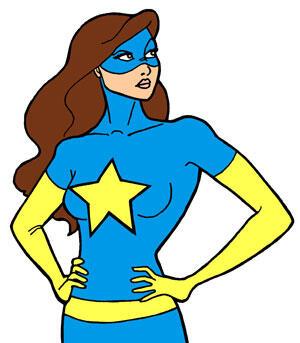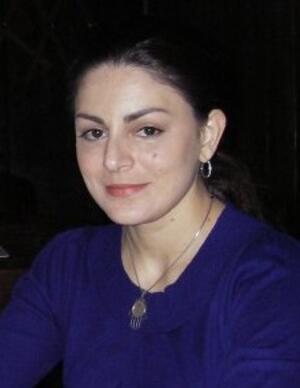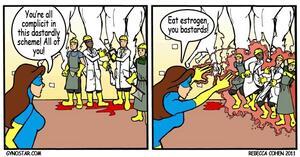Meet Rebecca Cohen and Gyno-Star, the world’s first explicitly feminist superhero
Courtesy of Rebecca Cohen.
Wonder Woman, created in the 1940s, showed the world that women could kick butt. Still, there’s a difference between a powerful woman superhero (i.e. a superhero who happens to be a woman) and a feminist superhero sworn to fight "forces of evil and male chauvinism." Gyno-Star, created by Rebecca Cohen, is the world’s first explicitly feminist superhero.
In The Adventures of Gyno-Star, our feminist superhero takes on contemporary feminist issues like hiring discrimination and body image personified by different types of anti-feminist super villains, including the super sexist “Vlad Deferens,” fashion magazine editor “Anna Rexia,” the free-market touting "Glibertarian," and her Sarah Palin-supporting, Fox News-watching nemesis, “Stay At Home Mommy.” Gyno-Star’s main superpower is the ability to make men feel the pain of childbirth. Little Sappho, Gyno-Star’s sidekick, is a radical feminist-Marxist lesbian teenager with the powers of "gaydar" and righteous rage.
I'll admit that I never much cared for superhero comics, I think because I didn’t really relate to them. But for the first time, there is a superhero champion fighting the same battles I do, whose frustrations mirror my own, and who takes action in ways I can only dream about. (How many times have I wished I could just punch a sexist idiot in the face with a "POW!" or simply zap a crowd of Tea Partiers with an “Enlightening Ray?”)
Originally from southern California, Rebecca Cohen holds a MA in Cinema Studies from NYU because, as she put it, she “didn’t want to risk acquiring any useful, marketable skills.” A former public school teacher and self-declared “New Yorker at heart,” Cohen recently moved to the Bay Area in California where she is happily out of work and focusing on cartooning. I caught up with her to learn more about her story:
Leah Berkenwald (LB): Could you tell us a bit about your Jewish background?
Rebecca Cohen (RC): I was raised in a pretty observant Conservative Jewish family. I think in southern California it's easy for Jews to feel dislocated and disconnected -- both my parents were from the east and their whole families were back east. So in the interest of imbuing us with a strong sense of identity, they sent my sister and me to a private Jewish elementary school. It really did the trick, I have to say. I remember learning to read and write Hebrew at the same time I learned to read and write English.
When I was a young child, Judiasm was a big part of our lives. As I got older, we drifted away from that a little, but we still observed. I went on a U.S.Y. trip to Israel at 14, and came home determined to make my family celebrate Shabbat every single week. That lasted for about 3 weeks.
By the time I was in college, day-to-day observance became less important to me. I personally feel a strong sense of Jewish identity, and I feel that because of my education and background, I have a good understanding of Jewish values. But religious observance isn't important to me personally. I guess I'm one of those "secular Jews" you hear about.
LB: When did you become a feminist? What was your "click" moment?
RC: This is an excellent question, and I'm sorry to say I don't have an exciting answer for it. I feel like I've always been a feminist. I'm not sure if this is something my parents did purposely, or if they got it right by accident, or if it was just a side effect of being weaned in the late '70s. I remember watching a lot of Charlie's Angels and Wonder Woman reruns as a young child, and although now I realize those shows are horribly cheesy and their feminist bona fides are questionable at best, to me as a 3- or 4-year-old, those women kicked butt. Them, and Cher. She had amazing outfits and this great quick wit. That's who I grew up wanting to be -- some kind of Wonder Woman/Cher hybrid. I also had one of those sparkly iron-on t-shirts that were really big in the early '80s, and it said, "Never underestimate the power of a woman." My parents picked that out, so looking back, I guess they really were trying to teach me feminist principles.
I don't specifically recall when I attached the term "feminism" to my views about gender equality. By the time I was old enough to know that feminism existed, I knew that it was something I believed in.
LB: When and how did you develop Gyno-Star? What does she mean to you?
RC: Gyno-Star started as a doodle in the margins of my high school notebooks. At that time, I was reading a lot of superhero comics. And like many kids who read superhero comics, I spent a lot of time drawing my favorite characters and inventing my own heroes. I started drawing Gyno-Star as this generic female hero with a cool energy power, and when people asked me who she was, I gave her the name as a joke. I actually stole the joke from a standup comedian I saw on TV (I'd give credit but I can't for the life of me remember who she was). The comedian was talking about political correctness and how everyone now has hypenated labels: African-Americans, Native-Americans, etc. She said she no longer wanted to be referred to as a woman, but rather as a "Gyno-American." So I stole the joke and called my character Gyno-Star, and gave her the tagline: "Fighting the forces of evil and male chauvinism." It made sense, because I was already known as an outspoken feminist. It was my thing, so it became her thing.
Over time she developed superpowers and villains and a sidekick, and in college I created 3 or 4 Gyno-Star comic strips for the underground comedy paper. Somehow it never occurred to me that I might go farther with the idea; Gyno-Star was sort of my inside joke with myself.
Then a few years ago, I uncovered a couple of those old issues of the college paper, and my husband went nuts. He was so enthusiastic. He kept pushing me to revive Gyno-Star and make more comic strips. It took me a while to motivate myself; at the time I knew very little about webcomics, I had no idea where or how to start. Then one day I decided I might as well try. I don't know what changed -- maybe I was just tired of his nagging. But I started a blog and began posting Gyno-Star comics. The feedback was amazing. It was very encouraging.
It started out as a hobby, something that I did for personal satisfaction and to entertain my friends. But pretty quickly the audience grew. And then I retired from teaching when we moved to California, and it actually occurred to me that I could do this as my job.
LB: Are Judaism and feminism connected for you?
RC: That's an interesting question. I've never really thought about it that way, and I'm inclined to think I'd be a feminist no matter my ethnicity or religion.
On the other hand, the congregation my family attended was egalitarian, and it was very deliberate about being egalitarian. Whenever the text of the siddur said "God of our fathers," our rabbi would read it aloud as "God of our ancestors." Whenever Abraham, Isaac and Jacob were mentioned, he would add in Sarah, Rebecca, Rachel and Leah. A lot of women wore yarmulkes, and I received a tallit for my bat mitzvah. (Although I do remember the congregation gave bar mitzvahs a kiddush cup, while bat mitzvahs got candlesticks, so there was some gender-based division of labor expected). I'm certain this approach must have influenced me and my feelings about gender equality.
I also think being Jewish in America does make you inclined to be politically progressive. There's something about being part of small minority in a democracy. The tyrrany of the majority is a very real fear, and the orthodoxies of the majority don't necessarily reflect your own values. It's easier to be critical of institutions when you feel you're on the outside looking in. And even though we're not a minority in terms of numbers, when it comes to large social, economic and political institutions, women are also on the outside looking in. In both cases you don't feel particularly invested in preserving the status quo.
LB: What are your goals for The Adventures of Gyno-Star?
RC: An animated TV series would be nice. Seriously, I feel like Gyno-Star presents an opportunity to sort of "sell" feminism. I have a lot of awesome feminist readers, but I also know that many of my readers are people who don't self-identify as feminists and don't see themselves as part of any feminist movements. They just enjoy superheroes, or webcomics, or politics, or things that are funny. Gyno-Star is an opportunity to present the lighter side of feminism. I can show that feminists do have a sense of humor. There's certainly a stereotype of the humorless feminist, and it's fun for me to dispel that.
Also, I think it's important for feminists to be able to laugh a little. We can be a serious bunch a lot of the time; we're always talking about heavy, important stuff. I think it's healthy to be able to laugh at your boogeymen; it takes away some of their power. At the same time it's even more important to be able to laugh at yourself. That, I believe, makes you stronger. Taking yourself too seriously is suicide. In fact I think that's one of the major themes that has emerged out of The Adventures of Gyno-Star.
LB: Is Gyno-Star Jewish?
RC: I always conceived of Gyno-Star as being a generic superhero. The problem there is that there's no such thing as a generic person, not even a generic feminist. You have to make some choices. So I gave her light skin and brown hair, because I have light skin and brown hair. But I still want her to be an "everywoman," so as much as I can I've been avoiding specific choices about her background.
This can only last so long, because as the series has gone on her character traits have filled in. For me, it's an effort to make sure that Gyno-Star isn't just a fantasy version of myself. So I have to ask how similar to myself I'm going to let her be. I feel like if I admit she's Jewish, then she's just me, but taller and with bigger boobs.
So the short answer is: No, she's not Jewish, but her hair is.










She is a TERF.
Really great stuff! Keep it up! I'd love to see a show based on these characters!
Awesome, sexy, and anti-sexist. My kind of girl! Keep up the good work. If you build it, they will come...